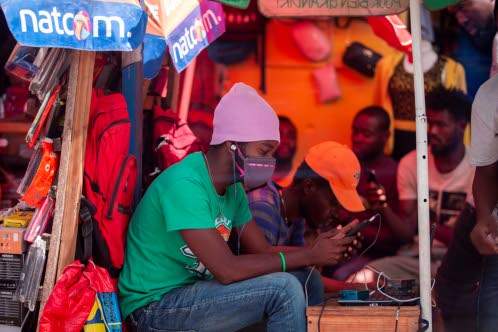BRIDGETOWN, Barbados (CMC) — Haiti is the only Caribbean Community (Caricom) country included in a humanitarian response plan launched by the United Nations on Wednesday as part of a global approach to fight the novel coronavirus disease (COVID-19).
The UN said the US$2 nillion COVID-19 Global Humanitarian Response Plan is intended to help vulnerable countries fight the coronavirus now, or millionswill be at risk if the virus is left free to circle back around the globe.
The UN launched the plan to fight COVID-19 in 51 countries across South America, Africa, the Middle East, and Asia. Haiti has so far recorded seven cases of the virus, which has also struck several other Caricom countries.
UN Secretary General Antnio Guterres, said the virus is arriving in countries already in the midst of humanitarian crises caused by conflicts, natural disasters, and climate change.
“We need to act now to stem the impact of COVID-19 in already vulnerable humanitarian contexts. And we need to maintain support for existing humanitarian response plans on which 100 million people depend,” he said.
“The world is only as strong as our weakest health system. If we do not act decisively now, I fear the virus will establish a foothold in the most fragile countries, leaving the whole world vulnerable as it continues to circle the planet, paying no mind to borders. This is the moment to step up for the vulnerable,” Guterres said.
Governments are being urged to commit to fully supporting the global humanitarian response plan, while sustaining funding to existing humanitarian appeals.
As of march 26, COVID-19 has killed more than 16,000 people worldwide and there are 500,000 reported cases. It has a foothold across the globe and is now reaching countries that were already facing humanitarian crisis because of conflict, natural disasters, and climate change.
The response plan will be implemented by UN agencies, with international NGOs and NGO consortia playing a direct role in the response. It will deliver essential laboratory equipment to test for the virus, and medical supplies to treat people as well as install hand-washing stations in camps and settlements.
The plan will also allow for the launch of public information campaigns on how to protect yourself and others from the virus; and establish air bridges and hubs across Africa, Asia and Latin America to move humanitarian workers and supplies to where they are needed most.
Undersecretary General for Humanitarian Affairs Mark Lowcock said, “COVID-19 has already upended life in some of the world’s wealthiest countries. It is now reaching places where people live in warzones, cannot easily access clean water and soap, and have no hope of a hospital bed if they fall critically ill.
“To leave the world’s poorest and most vulnerable countries to their fate would be both cruel and unwise. If we leave coronavirus to spread freely in these places, we would be placing millions at high risk, whole regions will be tipped into chaos, and the virus will have the opportunity to circle back around the globe.
“Countries battling the pandemic at home are rightly prioritising people living in their own communities. But the hard truth is they will be failing to protect their own people if they do not act now to help the poorest countries protect themselves,” he said.
“Our priority is to help these countries prepare and continue helping the millions who rely on humanitarian assistance from the UN to survive. Properly funded, our global response effort will equip humanitarian organisations with the tools to fight the virus, save lives, and help contain the spread of COVID-19 worldwide.”
The director general of the World Health Organization (WHO) Dr Tedros Adhanom Ghebreyesus said the virus is now spreading in countries with weak health systems, including some which are already facing humanitarian crises.
“These countries need our support — out of solidarity but also to protect us all and help suppress this pandemic. At the same time, we must not fight the pandemic at the expense of the other humanitarian health emergencies.”
UNICEF Executive Director Henrietta H Fore said children are the hidden victims of the COVID-19 pandemic.
“Lockdowns and school closures are affecting their education, mental health, and access to basic health services. The risks of exploitation and abuse are higher than ever, for boys and girls alike. For children on the move or living through conflicts, the consequences will be unlike any we have ever seen. We must not let them down.”
To kick-start the response plan, Lowcock released an additional US$60 million from the UN’s Central Emergency Response Fund (CERF), bringing CERF’s support to humanitarian action in response to the COVID-19 pandemic to US$75 million.
Now you can read the Jamaica Observer ePaper anytime, anywhere. The Jamaica Observer ePaper is available to you at home or at work, and is the same edition as the printed copy available at http://bit.ly/epaperlive


